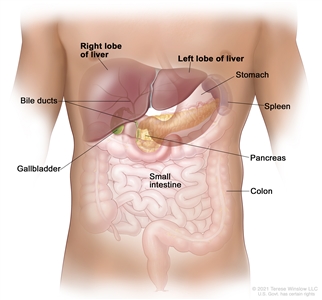Liver Cancer Screening
Screening is looking for cancer before a person has any symptoms. This can help find cancer at an early stage. When abnormal tissue or cancer is found early, it may be easier to treat.
It is important to remember that your doctor does not necessarily think you have cancer if he or she suggests a screening test. Screening tests are given when you have no cancer symptoms. If a screening test result is abnormal, you may need to have more tests done to find out if you have cancer. These are called diagnostic tests.
Tests to screen for liver cancer
Although there is no standard or routine screening tests for liver cancer, the following tests are being used or studied to screen for it:
Ultrasound
Ultrasound is a procedure in which high-energy waves (ultrasound) are bounced off the liver and make echoes. The echoes form a picture of the liver called a sonogram.
CT scan
CT scan is a procedure that makes a series of detailed pictures of the liver, taken from different angles. The pictures are made by a computer linked to an x-ray machine. A dye may be injected into a vein or swallowed to help the liver show up more clearly. This procedure is also called CAT scan or computed tomography.
Alpha-fetoprotein tumor marker
Tumor markers, also called biomarkers, are substances made by the tumor that may be found in the blood, other body fluids, or tissues. A high level of a specific tumor marker may mean that a certain type of cancer is present in the body.
Alpha-fetoprotein (AFP) is the most widely used tumor marker for detecting liver cancer. However, other cancers and certain conditions, including pregnancy, hepatitis, and other types of cancer, may also increase AFP levels.
Specific tumor markers that may lead to early detection of liver cancer are being studied.
Doctors use these screening tests to find, or diagnose, liver cancer. Learn more about Liver Cancer Diagnosis.
Risks of liver cancer screening
Decisions about screening tests can be difficult. Not all screening tests are helpful and most have risk of harms associated with them. Before having any screening test, you may want to discuss the test with your doctor. It is important to be aware of any possible harms of the test and whether the test has been proven to reduce the risk of dying from cancer.
The risks of liver cancer screening include the following:
- False-negative test results can occur. Screening test results may appear to be normal even though liver cancer is present. A person who receives a false-negative test result (one that shows there is no cancer when there really is) may delay seeking medical care even if there are symptoms.
- False-positive test results can occur. Screening test results may appear to be abnormal even though no cancer is present. A false-positive test result (one that shows there is cancer when there really isn't) can cause anxiety and is usually followed by diagnostic tests and procedures, such as a liver biopsy, which also have risks.
- Procedures to diagnose liver cancer can cause complications. Abnormal screening results may be followed up with a liver biopsy to diagnose liver cancer. Liver biopsy may cause the following rare, but serious, complications:
- hemorrhage
- trouble breathing
- leakage of bile, which can cause an infection of the lining of the abdomen
- a small puncture (hole) in an organ in the abdomen
- spread of cancer cells along the needle path where the biopsy needle is inserted and withdrawn (taken out)
Your doctor can advise you about your risk for liver cancer and your need for screening tests.
Last Revised: 2024-05-15
If you want to know more about cancer and how it is treated, or if you wish to know about clinical trials for your type of cancer, you can call the NCI's Cancer Information Service at 1-800-422-6237, toll free. A trained information specialist can talk with you and answer your questions.
